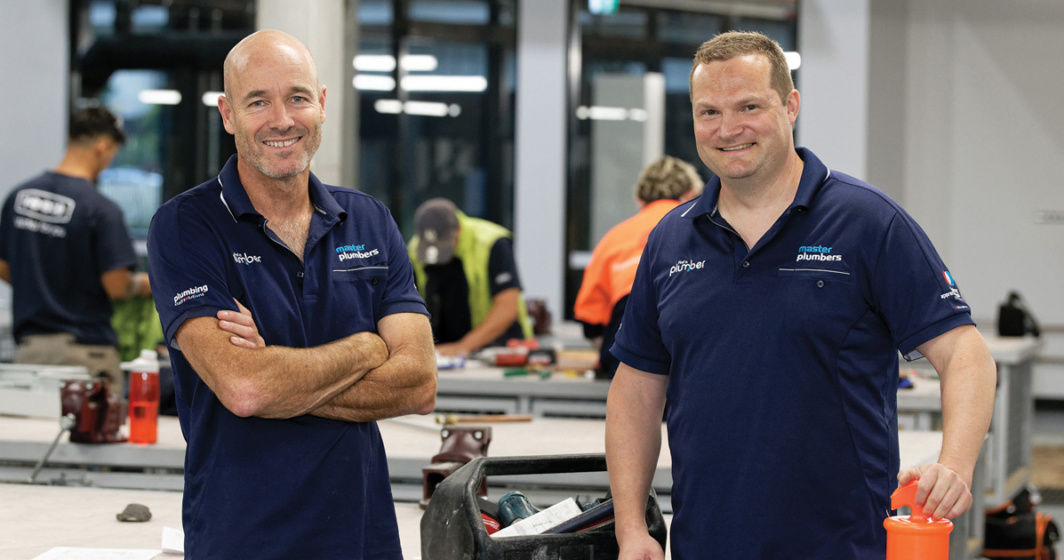Kate Jones discovers the passion and the professionalism that entices plumbers away from the tools and into the classroom.
It’s often their own experiences as apprentices – good and bad – that motivates plumbing trainers to walk away from the work site and into the training room.
For Darius Schoorl, a Master Plumbers trainer at the new Plumbing Industry Climate Action Centre (PICAC) at Narre Warren, it was a desire to teach others as well as he was taught.
“I did my apprenticeship with Master Plumbers in 1998 and I developed authentic relationships with the trainers there,” Darius said.

Master Plumbers is now searching for more trainers like Darius who can facilitate its programs at PICAC in Narre Warren.
Master Plumbers have been delivering training at the state-of-the-art facility for a year, but COVID restrictions interrupted training for Master Plumbers apprentices until earlier this year.
The training centre has a 100-seat auditorium, 12 training rooms, facilities for welding and gas fitting, plus confined-spaces and roof-access training areas. It also has impressive sustainability features including geothermal heating and cooling, and 770 solar PV panels.
Darius, who has been training plumbing apprentices for more than five years, took his first class at the centre in March.
“Even though I’ve been a trainer for years, I’m being given real assistance. When I had my first training session with apprentices at Narre Warren, my manager came and sat by my side to make sure it all went smoothly.
“There’s real support, which is not as common in my experience at TAFE.”
Darius’s interest in becoming a trainer was rekindled after showing his apprentices the ropes when he was running his own business.
“It was having apprentices that were good and also had a passion for the industry, and seeing them excel as I taught them that reignited this desire to get into training.”
Fellow trainer Richard Hutchinson began taking sessional classes while running his own business. He then switched to full-time after having children. “When I had children something just clicked. With young kids, it (teaching) is much better.
Hutchinson was also drawn to teaching to minimise the physical impact of plumbing work. “When I was in my 20s, I loved the physicality of plumbing,” he explained. “It was great because the body was stronger and you recovered quicker but after 40 you start to feel it everywhere.”
Perhaps the greatest drawcard for trainers like Richard and Darius it is the reward for effort. Both said they enjoy sharing their passion for the trade and helping apprentices develop skills they will call on for years to come.
“We’ve got some apprentices who are pretty disengaged learners a lot of the time, but who actually switch on when they’re motivated and start to think,” Richard said. “When they get into plumbing, it’s a bit more hands-on and they start to realise, ‘I understand this stuff’.
“It’s great when you see that; you do get a lot out of it.”
The shortage of plumbers across Australia, particularly in rural areas, means there is a high demand for teachers and trainers in the sector.
The importance of having quality trainers to shape the next generation of the plumbing industry experts can’t be underestimated, said Wayne Diffey, a trainer based at Master Plumbers’ Brunswick office.
“As a trainer, you’re passing on information. You’re trying to get the apprentices in the right frame of mind, trying to pass on the right skills and techniques and processes,” he said. “Showing them how to find information if they’re working for themselves, which standards to refer to, how to problem solve.
“It’s not only about being on the tools, it can also lead to them being a trainer, a manager, a plumbing arbitrator, an inspector or supervisor. There are lots of avenues for plumbers to take.”
Trainers need to complete a Certificate IV in training and assessment. Training Providers offer this program part-time over a 6-to-12-month period, so it can be managed while working full-time.
Share this Article






